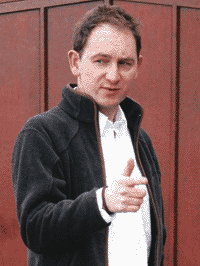Matthew Naylor: Nature strikes back

There was uproar in the Naylor senior household last week. Dad was livid.
He had a landmark birthday last year and decided to buy an indulgent car. We call it the ‘”menoPorsche”. Ordinarily it is kept undercover, but last Saturday it spent the night al fresco. At some point during the hours of darkness it was attacked.
On Sunday morning he found that it had been struck by not one but two pancake-sized bird droppings. If you are reading this in Scotland I’m not talking about one of your tiny pancakes: I mean one of the normal-sized, English ones. Like most Scottish cuisine, however, the contents of these missiles was sufficiently toxic to remove the lacquer on the paintwork.
There may be karma at work here; perhaps this attack was nature’s verdict on dad’s choice of vehicle. Possibly the RSPB have trained a crack team of enormous birds to go out and soil the cars with the biggest exhaust pipes. A bit like the Dambusters but with feathers and dirty bombs. I imagine that RSPB chief executive Graham Wynne commands them from mission control.
The offender had to be a heron. Those of you who have read my blog will be aware that I hate herons. It is one of my ambitions in life to creep up behind one and kick it up the jacksey with a stout shoe. We have loads of them around the farm. Despite this I’ve never had the agility to get close to one, not wearing my stout shoes anyway.
I know that LEAF Marque farmers are not supposed to kick bird’s bums. We have created habitats and as a rule we welcome wildlife, preferably once it’s potty trained. But farms are not zoos. You can’t choose your wildlife. Our own habitats are a bit like of those disastrous house parties that a teenager throws when their parents are away. Our farm has been gate-crashed by some undesirable chavvy types.
We host the National Pigeon Collection for starters and although we have a variety of wading birds and wildfowl, we major in predatory birds. We have plenty of hawks if you ever need to borrow one and we get regular visits from marsh harriers. Since the nearby A17 is like a fresh meat counter serving roadkill rats, rabbits and cats, we have a very high magpie population too.
It doesn’t take a genius to identify that these, coupled with two wet nesting seasons and a sharp winter explain the reduced populations of small nesting birds. Clearly there are very few genii working in national newspapers or for NGOs – they lay the blame flatly and simplistically at the feet of modern agriculture. Annoyingly, this is what fuels the wrong side of the debate over a compulsory replacement for set-aside.
I hope that DEFRA listens to Don Curry’s recommendation that the system should be a voluntary. Managing bird populations is not purely about creating more habitats. It requires a thoughtful and targeted approach and that includes controlling predator numbers. We need diversity and we need to protect the endangered of course, but there is no value in huge populations of individual species anyway.
More importantly, you know better than I do that productive land will become more and more scarce and food will become more and more precious in the future. The land is needed.
I’m guess that Graham Wynne is a fan of compulsory set-aside. He wants to watch out; if food goes short the fan will be hit with the same stuff as the menoPorsche.
- More from Matthew online. Read Matthew Naylor’s blog
